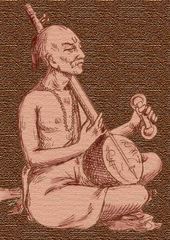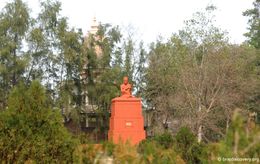Surdas (1478 – 1583) was a Hindu devotional poet, singer, and a saint (sant), who followed the Shuddhadvaita school of Brahmavada. He was a desciple of Mahaprabhu Shri Vallabhacharya. He lived during reign of king Akbar (1542-1606). Surdas spent most of his years in Vrindavan and created the epic literary work Sur Sagar. Surdas was born blind, and yet the most influential poet of Braj Bhasha and the 'Bhakti movement' after Tulsidas. Surdas was born blind and hence received harsh treatment from his family, and during his early childhood. One day at age 6, when he heard a group of devotional singers, passing by his home he simply followed them, and he left home forever. At age eighteen, Surdas met his future guru, the sant Sri Vallabhacharya on the banks of river Yamuna. Vallabhacharya took him under his tutelage and thus began Surdas's teaching in prevalent Bhakti Shuddha advaita (Non-dualism philosophy), as Vallabhacharya was the founder of the Pushti sect (Pushtimarg) in India.
Contents
Literary Works of Surdas
The work of Surdas mainly consists of the following three compilations.
Sur Saravali
Sur Saravali, based on the festival of Holi, originally consisted of hundred verses. In this poem, he tried to create a theory of Genesis, with Lord Krishna as the Creator.
Sahitya Lahiri
Sahitya Lahiri is mainly associated with Bhakti (devotion) towards the Supreme Lord.
Sur Sagar
Sur Sagar is considered to be the magnum opus of Surdas. The poem has been woven around the life of Lord Krishna. It originally contained 100,000 poems or songs, out of which only 8000 have survived the travails of time.
His work , the Sur Saravali, the Sahitya Lahiri and the Sur Sagar. In all these three volumes, there is a harmonious blend of emotion, devotion, imagination, aesthetic narration, innovative poetic forms. His physical impairment was never an obstacle but the sole reason for his becoming Saint Surdas.






